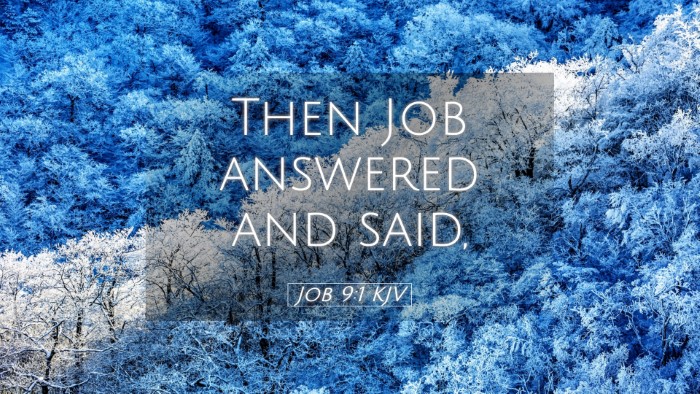Job 9:1 Commentary
Verse Context: Job 9:1 states, "Then Job answered and said," marking the beginning of his continued discourse amid the trials he faces. This verse serves as an introduction to his profound reflections on the nature of God and humanity’s relationship with Him.
Insights from Matthew Henry
Matthew Henry emphasizes Job's response as reflective of a man deeply troubled yet searching for understanding. He notes that Job’s dialogue is not merely a complaint but an earnest inquiry into the justice and sovereignty of God.
- Human Limitations: Henry points out that Job acknowledges his own limitations in understanding God's ways. He poses critical questions, suggesting that humanity cannot contend with the Creator.
- The Majesty of God: This verse leads to reflections on the majesty and power of God, showcasing Job's realization that divine wisdom far surpasses human understanding.
Insights from Albert Barnes
Albert Barnes provides a detailed analysis of Job’s lament. He observes that Job is drawn into a theological reflection where he recognizes both God’s omnipotence and his own insignificance.
- Job’s Distress: Barnes notes the depth of Job's suffering. His reply is filled with an awareness of his desperate condition that pushes him toward a profound confrontation with God’s cosmic authority.
- The Question of Justice: The commentary highlights Job’s struggle with the concept of divine justice. He grapples with the apparent paradox of suffering endured by the righteous compared to the success of the wicked.
Insights from Adam Clarke
Adam Clarke elaborates on the philosophical and theological implications presented in this verse. He interprets Job's statement as a pivot towards a deeper inquiry tailored by suffering.
- Dialogue with the Divine: Clarke argues that Job takes on a more conversational approach with God, seeking not merely answers but also a relational understanding of God’s governance in his life.
- Pursuit of Truth: He sees in Job's engagement a relentless pursuit for truth, where questions reflect both despair and hope for divine revelation and justice.
Thematic Reflections
This opening verse of Job’s answer pulls the reader into a tension-filled dialogue that is central to the text as a whole. The themes of suffering, divine justice, and humanity’s limitations are prevalent:
- Suffering and Its Purpose: The question arises of what purpose suffering serves in the life of the believer. This verse lays the groundwork for exploring how suffering can lead to deeper faith and knowledge of God.
- God's Sovereignty: Job’s assertion signifies an acceptance that, while he may not understand his plight, God remains sovereign and in control.
- The Human Condition: The discourse centers around humanity's place within God’s creation, emphasizing the need for humility before the divine.
Conclusion
In summary, Job 9:1 opens a profound inquiry into suffering, divine justice, and the relationship between God and man. Insights drawn from public domain commentaries enrich our understanding of Job’s intentions, prompting reflections valuable for pastors, students, and scholars alike.


